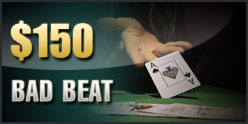After being down for more than two days, the bitcoin-only SealsWithClubs poker site has been restored.
On Monday, a source close to the situation told PokerNews that Stan Strickland, Director of Poker Operations at Borgata in Atlantic City, will resign. Strickland, who has headed the poker room since 2006, is rumored to be heading to the Isle Casino in Pompano Park, Florida, according to sources.
The Nevada Gaming Commission continued issuing interactive gaming licenses on Thursday. The latest recipients, 888 US Limited and Treasure Island, LLC, are now clear to participate in offering online poker in Nevada.
 The Global Poker Index released its updated rankings earlier this week and Steve O’Dwyer was one of the biggest movers thanks to his recent score at EPT London.
The Global Poker Index released its updated rankings earlier this week and Steve O’Dwyer was one of the biggest movers thanks to his recent score at EPT London.
 Fourteen Gaming Operators have applied to provide online gambling services to the Delaware State Lottery. The applicants, including PokerStars and 888, filed a Request for Proposals (RFP) before the Friday deadline in a highly competitive licensing process.
Fourteen Gaming Operators have applied to provide online gambling services to the Delaware State Lottery. The applicants, including PokerStars and 888, filed a Request for Proposals (RFP) before the Friday deadline in a highly competitive licensing process.
 Though gambling went unmentioned in the UK Chancellor’s budget speech Wednesday, the Office of Budgetary Responsibility (OBR) increased its estimate of future gaming revenue under the proposed Place of Consumption (POC) tax by more than £1bn over the next three years.
Though gambling went unmentioned in the UK Chancellor’s budget speech Wednesday, the Office of Budgetary Responsibility (OBR) increased its estimate of future gaming revenue under the proposed Place of Consumption (POC) tax by more than £1bn over the next three years.
 There's a new leader in the 2013 Global Poker Index Player of the Year race. Paul Volpe's incredible run on the World Poker Tour over the past month has vaulted him past Dan Shak and into the top position this week. Volpe (501.53 points) holds the slightest of margins over Mike Watson (501.20), while Shak (429.59) now sits in third.
There's a new leader in the 2013 Global Poker Index Player of the Year race. Paul Volpe's incredible run on the World Poker Tour over the past month has vaulted him past Dan Shak and into the top position this week. Volpe (501.53 points) holds the slightest of margins over Mike Watson (501.20), while Shak (429.59) now sits in third.
The last time Neteller was permitted in the U.S. Jamie Gold was the world champion and Main Event was attracting over 8,000 players.
 The Microgaming Poker Network (MPN) has officially released its new version of the bad beat jackpot with a record breaking €921,603 prize pool. The bad beat jackpot was suspended in early March for a revamp of its policies and requirements.
The Microgaming Poker Network (MPN) has officially released its new version of the bad beat jackpot with a record breaking €921,603 prize pool. The bad beat jackpot was suspended in early March for a revamp of its policies and requirements.
 The Nevada Gaming Commission has filed a Request for Comment from all licensees and interested persons on “regulations concerning interstate agreements for interactive gaming.”
The Nevada Gaming Commission has filed a Request for Comment from all licensees and interested persons on “regulations concerning interstate agreements for interactive gaming.”




















